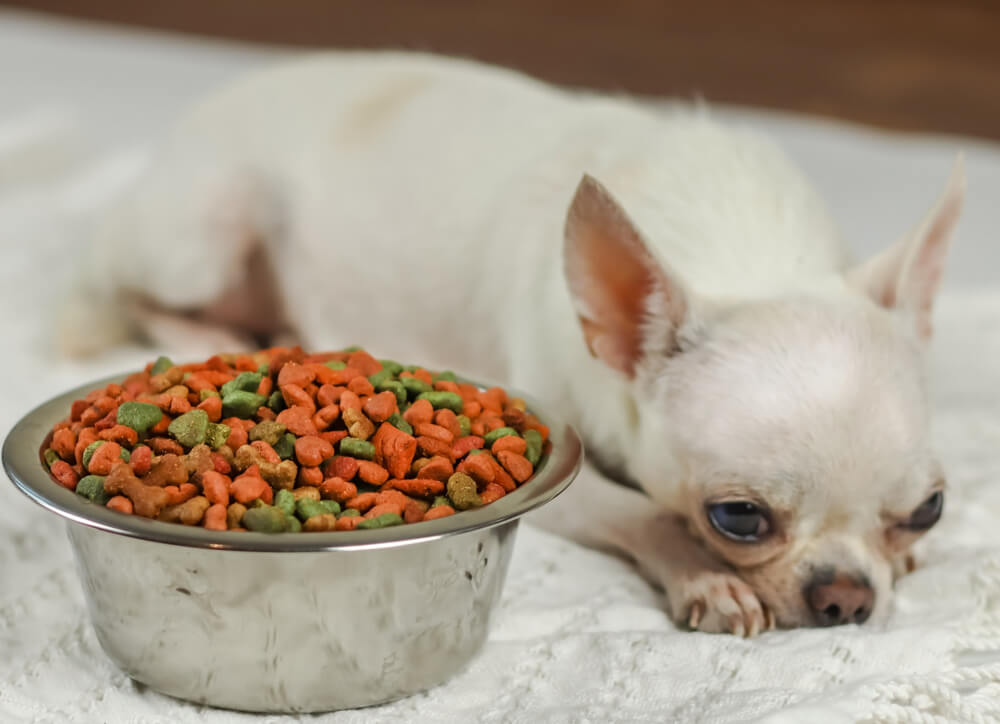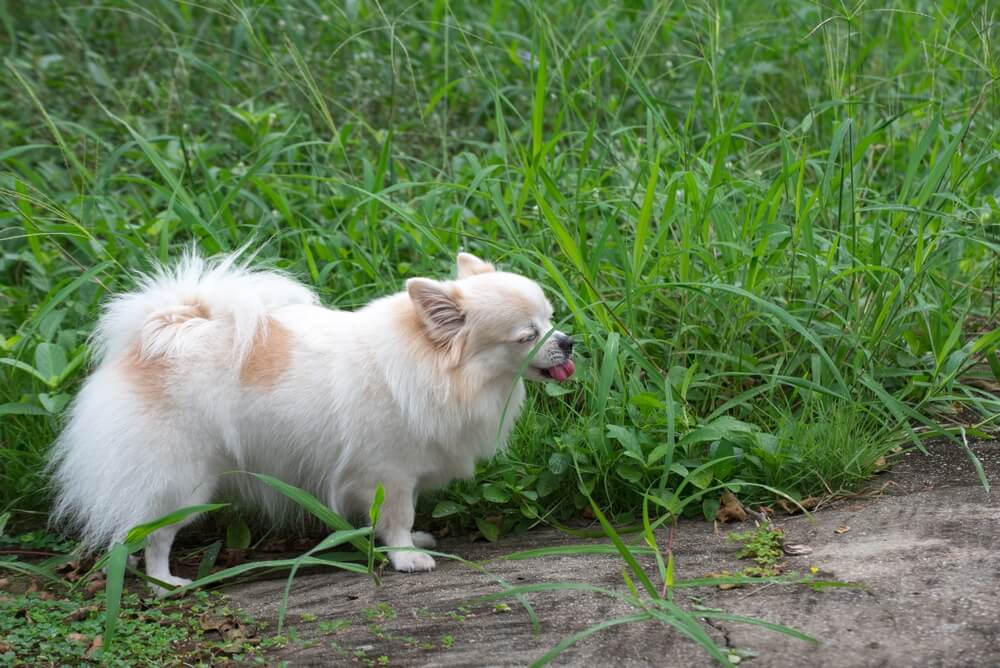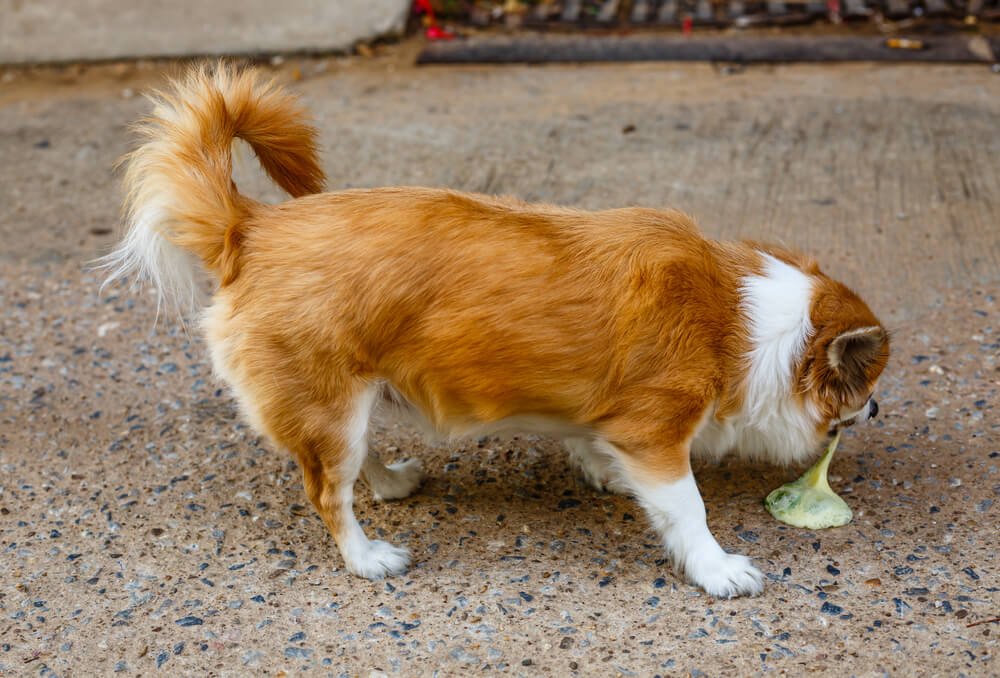
If your Chihuahua has stomach problems, you’re probably a little concerned and keen to get to the bottom of it. After all, it’s no fun cleaning up vomit and diarrhea, and it’s even more upsetting seeing your furry friend feeling unwell. In this article, you can find out what to expect from Chihuahua stomach problems – from symptoms to causes, and what you can do to help.
Symptoms of stomach problems in Chihuahuas

Dogs who are feeling nauseous will often drool. So, if you notice that your dog is hyper-salivating, it could be that they feel sick.
If your chihuahua has stomach problems, you might notice the following symptoms:
· Vomiting
Probably one of the most common symptoms associated with an upset stomach in Chihuahuas is vomiting. This might be undigested food, foam, or yellow bile, and it’s important to differentiate vomiting from regurgitation because the causes differ.
· Reduced appetite
It’s common for dogs with stomach issues to go off their food. This is often because they feel nauseous, their stomach is painful, or they’re running a fever. Here’s an article about what to feed a sick dog with no appetite.
· Dribbling
Dogs who are feeling nauseous will often drool. So, if you notice that your dog is hyper-salivating, it could be that they feel sick.
· Diarrhea
Although diarrhea is usually associated with gut issues rather than the stomach, the two often occur together. An example of this is gastroenteritis.
· Gas
Again associated with gut irritation or disruption, flatulence could suggest a stomach problem.
· Change in thirst
Stomach problems could cause your Chihuahua to drink more than normal, to replace the fluid lost as vomit or diarrhea. However, if they’re feeling poorly or have a fever, they might not drink much at all.
· Prayer position
If you notice your dog crouching down on their front legs and lowering their chest to the floor while keeping their back end raised, this is known as the prayer position. This posture often suggests belly pain and can be a sign of stomach problems.
· Bad breath
If your Chihuahua is vomiting or off their food due to nausea caused by kidney disease, they may also have other symptoms like bad breath.
What are the causes of Chihuahua stomach problems?

Some dogs have sensitive stomachs and may react to dog food with new ingredients. If this settles quickly, it’s likely a sensitivity rather than an allergy.
Here are some of the most common causes of stomach problems in dogs:
Dietary indiscretion
Although they’re not particularly renowned for being scavengers, there are always exceptions! If a Chihuahua eats something unpleasant out on a walk or guzzles a human treat in the house, they could develop vomiting or diarrhea. If what they have eaten could be toxic or cause a blockage in the stomach or gut, you must consult your veterinarian right away.
Sensitive stomach
Some dogs have sensitive stomachs and may react to dog food with new ingredients. If this settles quickly, it’s likely a sensitivity rather than an allergy, but…
Allergies
…Many dogs are thought to have sensitive stomachs when the real cause of their symptoms is a food allergy. This won’t settle with time and requires treatment and a change of dog food.
Parasites
It’s important to worm your dog regularly, no matter the breed. Parasites like worms, giardia, and other intestinal nasties can lead to vomiting and diarrhea symptoms and can be picked up easily from the environment. Some even pose a threat to humans too, so it’s best to give treatment as recommended by your vet.
Pancreatitis
Inflammation of the pancreas gland is known as pancreatitis and can cause vomiting and severe abdominal pain. The cause isn’t always determined, but it’s often linked to eating a particularly rich or fatty meal.
Infection
Bacteria and viruses can lead to infections of the stomach and gut, known as gastroenteritis. If this is the case your dog may have a fever, stop eating, or become dehydrated. Many cases will also have blood in their stools.
Organ or metabolic issues
Many conditions can indirectly lead to vomiting and stomach problems. These include Addison’s disease, kidney failure, cancer, and liver disease. If your veterinarian is concerned that your Chihuahua’s stomach problems are due to a more serious underlying cause, they may run blood work and other diagnostic tests.
How can you help your Chihuahua with stomach problems?

To support your Chihuahua with stomach problems alongside veterinary treatment, you should consider feeding them a limited ingredient diet – the fewer ingredients, the less likely their stomach or intestine will react adversely.
If your Chihuahua has stomach problems and isn’t eating or seems unwell, it’s really important to get them checked over by a veterinarian. The vet can examine them and perform any necessary tests to reach a diagnosis. Depending on the cause your dog might require medication, varying from an anti-sickness medication or anti-biotic, to steroids or a fluid drip.
To support your Chihuahua with stomach problems alongside veterinary treatment, you should consider feeding them a limited ingredient diet. The fewer ingredients, the less likely their stomach or intestine will react adversely, which should allow time for any irritation to heal. While a bland or limited ingredient diet can be used short term, there are some that are formulated to meet AAFCO’s standards for a complete & balanced diet that are safe to use as a main dog food. Therefore, if your dog is prone to gut sensitivities or allergies, choosing a limited ingredient diet that’s still appetizing and nutritionally balanced could help to manage their symptoms long term, without them getting bored.
Summary
Many stomach problems in dogs are triggered or exacerbated by the wrong dog food. If your dog has symptoms like vomiting, diarrhea, or flatulence, and they’ve been checked by a vet, their stomach problems could be improved with a limited ingredient dog food.
FAQs
What helps a Chihuahua upset stomach?
A bland or limited ingredient dog food can help to settle a dog’s stomach, especially if their symptoms are caused by dietary indiscretion or a sensitive stomach. Longer-term conditions, like food allergies, can also be improved with a change in dog food. It’s important to speak to your veterinarian first, though, to make sure there’s nothing else going on.
Are Chihuahua’s stomachs sensitive?
Chihuahuas can be quite fussy, and they are prone to sensitive stomachs. A human-grade dog food with limited ingredients could improve their appetite while preventing a flare of vomiting or diarrhea.
How do you know if your dog has intestinal problems?
If your dog has intestinal problems you might notice weight loss, diarrhea, or vomiting. They might also become pickier with food or stop eating altogether. On the other hand, they could be ravenous, trying to absorb more calories.
Are Chihuahuas prone to diarrhea?
Any dog can suffer from diarrhea, especially if they eat things they shouldn’t or have sensitive guts so it’s best to keep their diet stable.


